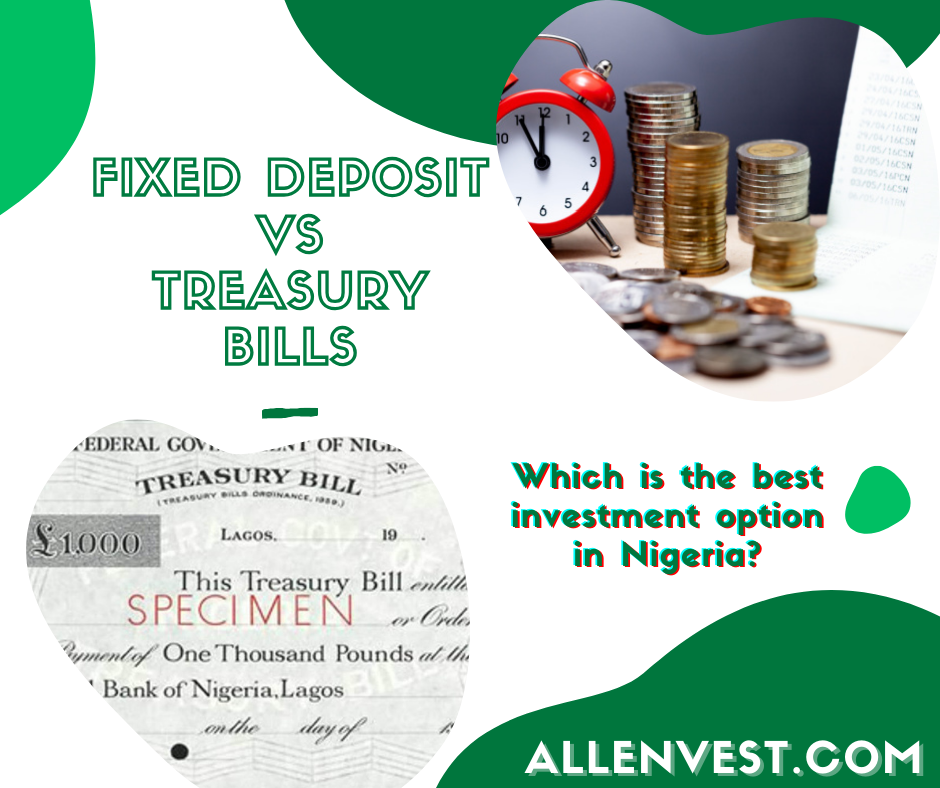
If you are a risk-averse investor or someone looking for a secure way to save your money while earning some interest, fixed deposit accounts can be a smart choice. In this article, we will explain the world of fixed deposit accounts in Nigeria, explaining what they are, how they work, and the benefits they offer.
What is a Fixed Deposit Account and How Does It Work?
A Fixed Deposit Account, also known as a time deposit or term deposit, is a type of savings account offered by banks where you deposit a specific amount of money for a predetermined period, ranging from a few months to several years.
In return, the bank pays you a fixed interest rate, which is higher than the interest rate offered on regular savings accounts. Some investors like this account when they don’t want much risk and are okay with putting their money away for a while to get guaranteed profits.
Things to Know Before Opening a Fixed Deposit Account in Nigeria
Before opening a Fixed Deposit Account in Nigeria, there are some important things you should know:
1. Interest Rates
Fixed Deposit Accounts typically offer higher interest rates compared to regular savings accounts. However, these rates can vary between banks, so it’s essential to compare rates before choosing a bank.
2. Lock-in Period
When you open a Fixed Deposit Account, you agree to keep your money deposited for a specific period, known as the lock-in period. Withdrawing funds before the end of this period may result in penalties or loss of interest.
3. Minimum Deposit
Most banks require a minimum deposit amount to open a Fixed Deposit Account. Make sure you have the required amount before initiating the account opening process.
4. Interest Payment Frequency
Depending on the bank’s policy, interest may be paid out periodically (monthly, quarterly, or annually) or at the end of the deposit term. Choose an option that aligns with your financial goals.
5. Renewal Options
Some Fixed Deposit Accounts offer automatic renewal options, where the deposit is renewed for another term upon maturity unless instructed otherwise. Understand the renewal process and opt-out if necessary.
6. Early Withdrawal Penalties
If you need to withdraw your funds before the maturity date, be aware of any penalties or fees associated with early withdrawals. These penalties can vary depending on the bank and the remaining duration of the deposit.
Pros and Cons of Fixed Deposit Accounts in Nigeria
Pros
1. Stable Returns
Fixed Deposit Accounts offer predictable and stable returns, making them a reliable option for conservative investors seeking steady income.
2. Higher Interest Rates
Compared to regular savings accounts, Fixed Deposit Accounts typically offer higher interest rates, allowing investors to earn more on their deposited funds.
3. Capital Preservation
Your principal amount is protected in a Fixed Deposit Account, ensuring that you receive back the initial deposit amount plus the accrued interest at the end of the deposit term.
4. Diversification
Fixed Deposit Accounts can be part of a diversified investment portfolio, providing a balance between higher-risk investments like stocks and bonds.
5. Low Risk
Fixed Deposit Accounts are considered low-risk investments because they are backed by the bank’s guarantee, providing a sense of security to investors.
Cons
1. Lack of Liquidity
Funds deposited in Fixed Deposit Accounts are typically locked in for a specific period, known as the maturity period. Withdrawing funds before the maturity date may result in penalties or loss of accrued interest.
2. Fixed Returns
While stable returns are a benefit, they can also be a drawback for investors seeking higher returns. Fixed Deposit Accounts may not offer the same potential for growth as other investment options like stocks or mutual funds.
3. Inflation Risk
Inflation can erode the purchasing power of your returns from Fixed Deposit Accounts over time. If the interest earned is lower than the inflation rate, your real returns may be diminished.
4. Opportunity Cost
By tying up funds in a Fixed Deposit Account, investors may miss out on other investment opportunities that could offer higher returns or better flexibility.
5. Interest Rate Fluctuations
Fixed Deposit interest rates are subject to change based on market conditions and monetary policy. This means that the interest rate offered at the time of deposit may not remain the same throughout the entire deposit period.
Also Read
Fixed Deposit vs Treasury Bills in Nigeria: Which is better?
Types of Fixed Deposit Accounts in Nigeria
In Nigeria, banks offer various types of Fixed Deposit Accounts to cater to different needs and preferences of customers. Here are some common types.
1. Regular Fixed Deposit Accounts
These are standard Fixed Deposit Accounts where customers deposit a lump sum for a specified period at a fixed interest rate.
2. Flexi Fixed Deposit Accounts
Flexi Fixed Deposit Accounts offer flexibility in terms of deposit and withdrawal options. Customers can add funds to the account at any time and may have the option to withdraw a portion of the deposit before the maturity date, although this may come with penalties.
3. Senior Citizen Fixed Deposit Accounts
Some banks offer Fixed Deposit Accounts specifically designed for senior citizens, usually with preferential interest rates and additional benefits such as priority service.
4. Corporate Fixed Deposit Accounts
These accounts are tailored for businesses and corporations looking to invest surplus funds for a fixed period. Corporate Fixed Deposit Accounts may offer higher interest rates compared to individual accounts.
5. Cumulative Fixed Deposit Accounts
In these accounts, the interest earned on the principal amount is reinvested along with the principal at regular intervals, usually quarterly or annually, until the maturity date. This allows for compounding interest and potentially higher overall returns at maturity.
6. Tax-Saver Fixed Deposit Accounts
These accounts offer tax benefits to investors under specific conditions, such as a lock-in period. Interest earned on Tax-Saver Fixed Deposit Accounts may be eligible for tax deductions under certain provisions of the Nigerian tax laws.
Requirements to Open Fixed Deposit Accounts in Nigeria
To open a Fixed Deposit Account in Nigeria, you usually need to meet the following requirements:
1. Valid Identification
You’ll need to provide a valid means of identification such as a national ID card, international passport, or driver’s license. You also need to submit two recently taken passport photographs.
2. Proof of Address
Nigerian banks will require proof of your residential address, which can be provided through your recent utility bills, rent agreements, or other official documents.
3. Minimum Deposit
Most banks in Nigeria have a minimum deposit requirement to open a fixed deposit account. The amount varies depending on the bank and the type of account.
4. Completed Application Form
You’ll need to fill out an application form provided by the bank, providing details such as your name, address, contact information, and source of funds.
5. Source of Funds
You may need to provide information about the source of the funds you intend to deposit into the fixed deposit account.
How to Choose the Right Bank for Your Fixed Deposit Account
It’s very important that you pick the best bank that offers the best fixed deposit services. In one of our blog posts, we’ve explained that and also highlighted the top Nigerian banks for fixed deposits.
Dont Miss
Fixed Deposit Interest Rates of the Top 8 Banks in Nigeria
How to Open a Fixed Deposit Account in Nigeria
Opening fixed deposit accounts in Nigeria is usually a straightforward process. Here’s how you can do it.
1. Choose a Bank
Decide which bank you want to open your Fixed Deposit Account with. Consider factors like interest rates, reputation, and convenience.
2. Visit the Bank
Go to the nearest branch of the chosen bank. Make sure to take along all the required documents and information.
3. Speak to a Bank Officer
Once at the bank, ask to speak to a bank officer who can assist you with opening a Fixed Deposit Account.
4. Fill Out an Application Form
The bank officer will provide you with an application form to fill out. Provide accurate information and double-check before submitting.
5. Submit Required Documents
Along with the application form, submit all the required documents such as valid identification, proof of address, and minimum deposit.
6. Review Terms and Conditions
Before finalizing the account opening, make sure to review the terms and conditions of the Fixed Deposit Account, including the interest rate, tenure, and withdrawal conditions.
7. Deposit Funds
Once everything is in order, deposit the required funds into the Fixed Deposit Account. The bank will provide you with a receipt or confirmation of the deposit.
8. Receive Confirmation
After the deposit is made, the bank will confirm the opening of your Fixed Deposit Account. They may provide you with a certificate or statement as proof.
How to Calculate Fixed Deposit Interest in Nigeria
Calculating Fixed Deposit interest in Nigeria is simple. Here’s how you can do it:
1. First, write down the interest rate offered by your bank for the Fixed Deposit Account. This rate is usually stated as an annual percentage.
2. Write down the tenure or duration of your Fixed Deposit. It could be months or years, depending on your preference and the bank’s terms.
3. Use the Formula below:
Interest = Principal Amount × Interest Rate × Time Period / 100
Principal Amount is the initial amount you deposit into the Fixed Deposit Account.
Interest Rate is the annual interest rate offered by the bank.
Time Period is the duration for which you’re depositing the money, usually in years.
4. For instance, if you deposit ₦100,000 in a Fixed Deposit Account with an annual interest rate of 5% for 1 year, the calculation would be:
Interest = 100,000 × 5 × 1 / 100
= ₦5,000
So, you would earn ₦5,000 as interest at the end of the year. The total amount you’ll withdraw at the end will be ₦105,000
Frequently Asked Questions about Fixed Deposit Accounts in Nigeria
1. Is fixed deposit safe in Nigeria?
Yes, fixed deposit accounts in Nigeria are generally considered safe. They offer a guaranteed return on your investment, making them a secure option for saving money.
2. Which bank is best for fixed deposit in Nigeria?
The best bank for a fixed deposit in Nigeria depends on various factors such as interest rates, tenure options, and customer service. It’s advisable to compare offerings from different banks before making a decision. Here are the fixed deposit interest rates of the top banks in Nigeria.
3. How much does it cost to open a fixed deposit account in Nigeria?
The cost of opening a fixed deposit account in Nigeria varies from bank to bank. Some banks may have a minimum deposit requirement, while others may not charge any opening fees.
4. How does fixed deposit work in Nigerian banks?
Fixed deposit works by depositing a specific amount of money with a bank for a predetermined period at a fixed interest rate. The bank pays interest on the deposited amount, and at the end of the tenure, the principal amount along with the interest is returned to the depositor.
5. Can I withdraw money from a fixed deposit account?
Yes, you can withdraw money from a fixed deposit account before the maturity date, but it may come with penalties or a reduction in interest earned. Some banks also offer partial withdrawal options, allowing you to access a portion of your funds while keeping the rest invested.
6. What is the disadvantage of fixed deposit accounts in Nigeria?
One disadvantage of fixed deposit accounts in Nigeria is that the interest rates offered may not always keep pace with inflation, resulting in a loss of purchasing power over time. Also, funds deposited in a fixed deposit account are not easily accessible in case of urgent financial needs.
Our telegram group is now open to the public. Get instant access to the latest blog posts, updates, exclusive content, and valuable insights on banking, investing, and financial planning.
Stay connected with us for a brighter financial future.


Pingback: Fixed Deposits vs Treasury Bills in Nigeria: Which is better? - AllenVest.com
Pingback: How to Choose the Best Bank Accounts in Nigeria - AllenVest.com